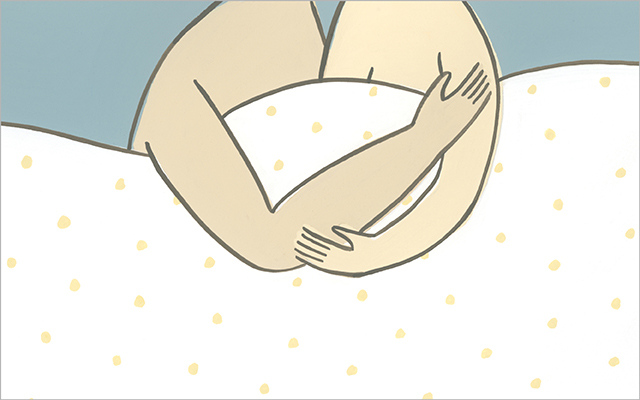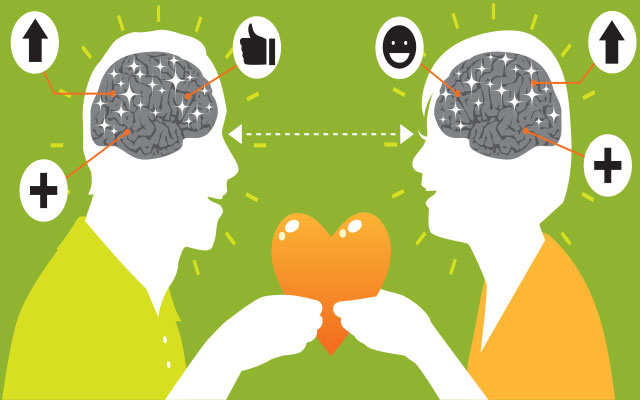ARTICLE SHORTCUTS
Balance Your Hormones | Nutrition | Move Your Body | Explore All of Your Senses | Address Shame | De-Stress Daily | Get to Know Your Own Body | Schedule It | Start Foreplay in the Morning
On the surface, it seems that Americans are pretty forthright about sex. Millions use online dating apps like Tinder to hook up for casual encounters. Bawdy movies like Trainwreck cash in at the box office. And countless articles proffering “10 Tips for Amazing Sex!” litter magazines and the Internet.
Still, a hypersexualized culture is hardly synonymous with healthy sensuality. And that is something that many of us are often afraid to address — with our partners or ourselves.
“There’s still a lot of shame and a reluctance to shine a light on sexuality,” says functional-medicine OB-GYN Sara Gottfried, MD, the New York Times best-selling author of The Hormone Cure and The Hormone Reset Diet. She feels this reluctance has alienated us from our rightful sensuality, making sexual pleasure “the stuff of Hollywood movies and porn rather than a real, organic, yummy part of our normal physiology.”
A healthy libido has benefits that go far beyond the bedroom. In fact, cultivating positive sensual experiences is key to our overall health, right up there with eating a nutrient-dense diet and forming good exercise habits.
“A fulfilling sexual life not only deepens connections; it releases pent-up emotions and physical tension, which lowers your stress hormones and increases endorphins — neurochemicals that help slow aging, lessen depression and anxiety, boost the immune system, and usher in bliss,” says Judith Orloff, MD, a professor of psychiatry at UCLA and author of The Power of Surrender and the New York Times bestseller Emotional Freedom.
“Quite simply,” she adds, “if you have endorphins going through your system, you’re going to be in a healthier, happier state to confront all the frustrations of the world.”
Gottfried agrees: “Sexual satisfaction is a much-needed nutrient. It reconstitutes us hormonally, emotionally, and spiritually.”
Not only does our interest in, and energy for, sensual connections affect our general health, but the reverse is true as well: What we eat, how we move our bodies, and how we handle stress all directly influence our libidos.
“Most people have a fragmented sense of their health and don’t connect the dots between their global lack of energy or life force and their lack of sexual energy,” explains Gottfried. “But these energies overlap significantly.”
So what are the best strategies for cultivating a healthy sensuality and a satisfying sexual life that supports good health? The following suggestions from integrative-health experts will provide some answers and help you develop a more satisfying connection with your body — and your partner.
Balance Your Hormones
When it comes to sexual satisfaction, hormonal harmony is key. About 70 percent of low sex drive is due to out-of-whack hormones, says Gottfried. (The other 30 percent is due to a variety of factors, including relationship dissatisfaction and medical issues.) And although there is no one magic bullet that will balance hormones, a multipronged approach that includes diet and lifestyle changes will yield results in and out of the bedroom.
“Most people don’t just have low sex drive and no other symptoms,” explains Gottfried. “They are usually tired, have adrenal fatigue, or are depressed, or their gut isn’t working.”
She recommends taking a “functional-medicine approach” that addresses the root causes of such symptoms. “Changing the way you eat, move, think, and supplement tends to make everything better,” she says. (For more on Gottfried’s -hormone protocol, check out “In Depth With Sara Gottfried, MD (Video)“.)
A healthy sex drive helps you maintain hormone balance. “Within 30 seconds of orgasm, the main hormone that increases is oxytocin, which is not only the hormone of love and bonding, but the hormone that reconstitutes you hormonally,” says Gottfried.
“It actually lowers your cortisol, and most people can feel that — their stress response resolves. It raises estradiol and it makes your thyroid more efficient. A satisfying sexual experience is like natural hormone therapy, but free.”
If you suspect your hormones are imbalanced and affecting your sex drive, a consultation with an integrative-health practitioner can be a great place to gain some insight. (For more on the health factors that influence libido, see “Boost Your Libido“.)
Up Your Nutrition Game
“Food is the most powerful drug we have, and it’s truly a game changer in terms of how people feel on a daily basis,” says Marcelle Pick, OB/GYN, NP, the author of Is It Me or My Hormones? That’s why a nutritional overhaul is the first thing she discusses with patients seeking a boost in their vitality and libido.
Pick prefers a Mediterranean diet, which incorporates plenty of plant-based whole foods and good fats from nuts and olive oil: “Just by tweaking the diet, people’s energy comes up. Their joints stop hurting. The thyroid starts regulating properly. They feel like new people.”
It’s also critical to ditch the sugar, says functional-health coach Alexandra Jamieson, host of The Crave Cast podcast and author of Women, Food, and Desire (and this month’s cover subject). This is because the roller-coaster blood-sugar levels that sugar can cause can wreak havoc on your libido. And energy crashes aren’t sugar’s only downside.
“Sugar is a huge hormone disruptor,” she points out. “Sugar kills testosterone — for both men and women — and if your testosterone is low, your libido is going to be low.”
So the next time you’re planning a romantic dinner, consider serving a little dark chocolate for dessert instead of a giant piece of cake.
(Also, learn more about herbal support at “4 Herbs to Boost Your Sex Drive.”)
Move Your Body
Exercising not only helps you feel better about your body; it’s also an important tool to balance hormones and improve libido. For men, specifically, studies have shown that high-intensity interval training and strength training help boost testosterone levels. (For more on natural ways to raise testosterone, see “Testosterone Tweaks“.)
For both men and women, though, the key is crafting a fitness plan that you can stick with. Gottfried loves learning new things, so she regularly tries different routines, including barre workouts, kickboxing, and Zumba. And, because beauty is important to her, she likes to run outdoors in beautiful locales.
She suggests her patients schedule exercise in the morning, keep it short, and increase accountability by working out with a trainer or friend. Better yet, try working out with a significant other; increased endorphins and pheromones can amplify your attraction. (For more on the benefits of working out with a partner, see “Strength in Numbers: The Importance of Fitness Buddies“.)
However you choose to move your body, the key is picking something that feels good, says Saida Désilets, PhD, author of Emergence of the Sensual Woman: Awakening Our Erotic Innocence. “Our bodies are meant to move. Doing some exercise that appeals to you is critical for hormonal vitality, whether it’s dancing, going to the gym, taking a walk, or horseback riding — it doesn’t really matter.”
(Try these playful moves to engage your muscles and your senses and will help to prime you for intimacy.)
Explore All of Your Senses
To cultivate a healthy sensual life, it’s essential to widen your practice of pleasure beyond sex.
“When we think ‘sexuality,’ we instantly conjure up an image of intercourse, but sensuality and sexuality are much deeper and broader than just that particular act,” says Désilets.
Long baths, aromatherapy, getting outside in nature, giving or receiving massage, or finding time for morning solitude are all creative, healthy options for developing the neural pathways devoted to satisfaction.
Even the way you approach a meal can help you build your receptivity to sensuality.
“When you’re eating, is it delighting you? Are you actually tasting it, smelling it, enjoying it, maybe even expressing verbal appreciation for it?” asks Désilets. This matters, because whenever we practice paying attention to sensory experiences, we build a bigger capacity for pleasure.
Address Shame
Although our popular culture is chock-full of sexual references, many of us have a hard time discussing what authentic sexuality looks like. Even most medical practitioners are uncomfortable asking about sexual health, observes Pick.
“I ask patients all the time: ‘How often are you sexually active?’ ‘Are you having regular orgasms?’ And even in my office, their response is, ‘Oh, my gosh, seriously? We’re going to talk about this now?’” she says. “But we need to talk about it. It’s a critical element of health.”
Much of our discomfort is rooted in ignorance and shame.
“We are a culture that is very suspicious of pleasure,” says Christiane Northrup, MD, the best-selling author of many books, including Women’s Bodies, Women’s Wisdom. To her point: Only 22 states and the District of Columbia currently mandate sex education in public schools. And those programs almost universally shy away from discussing pleasure and sensuality in connection with sex.
Jamieson concurs: “When I took sex ed, I learned what sex is and what it can result in, but that’s not the same as sexuality. We’re in this hypersexualized culture, but we stop before we talk about the fact that sex should feel good. There’s still so much shame, myth, and religiosity around sex. If you’ve been taught that sex is a sinful thing, how can you embrace it as healthy?”
If you find it difficult and embarrassing to even address sexuality, start small. Try some of Désilets’s suggestions for exploring your senses (above) to begin reconnecting with yourself.
De-Stress Daily
Joy and fun are prerequisites for a healthy libido, says Pick. When we’re tense and distracted by obligations, our natural biological sense of desire never has a chance to ramp up.
“I try to teach people to be really present,” she says. “Many people are so addicted to work that they just don’t know how to relax, especially the younger generation. If you’re working 60 hours a week, your brain is not going to turn off enough to shift those biochemicals. And, if you’re not relaxed, enjoying sex is never going to happen.”
“Stress kills everyone’s libido,” agrees Jamieson. “It’s important to develop regular stress-management rituals. What can you build into your daily schedule to indulge yourself, to relax and let go?”
These rituals can be as simple as turning off your phone and email after work, pouring an evening cup of tea or a glass of wine, or taking a bath. Anything that signals “off duty” to your body is likely to make you more interested in sex.
Get to Know Your Own Body
While it may carry a lot of stigma, all of our experts say that masturbation — or what Northrup calls “self-cultivation” — is a natural and necessary part of sexual health.
“One can be very sexual without having sex with another individual,” Northrup points out. That’s important, she says, because otherwise people without partners might think, “Well, that counts me out.”
Not only can you explore sexuality and sensuality on your own, but there are significant gains for doing so. Knowing your own preferences makes it much easier to communicate them to someone else.
“Expecting another human being to know your body better than you is a bit of insanity,” says Désilets. “If you are sexually confident in your own body, that translates epically when you connect with another person.”
Jamieson adds that it’s especially important for women to explore their own bodies, even if they’re in a partnership. “I’m constantly encouraging women to masturbate, even if they’re already in a long-term relationship, because when you masturbate, you learn your own body in a totally new way,” she says.
Schedule It
It may not sound romantic, but scheduling sex with your partner can do a lot for romance, especially if you’re in a long-term relationship, says Northrup.
“So many couples are so stressed about the daily to-do list — working, getting the laundry done, getting the kids bathed — that sex becomes something they do on vacation,” she says. But she suggests not waiting: Put romance on your schedule.
In the meantime, Gottfried advises that you don’t hesitate to take the chance for intimacy whenever it arises. “Don’t wait until there’s chocolate, roses, your favorite restaurant, and the whole package,” she says. “Whenever there’s the faintest glimmer of attraction or sexual interest, go for it!”
She suggests that when you feel warmly toward your partner — if she says something kind, if he does something just right — seize the moment. The more often you connect, the easier it is to stay connected. And that’s better for everyone.
Start Foreplay in the Morning
Although every individual is unique in his or her erotic preferences, there are some consistencies among male and female libidos.
So while the FDA approved the so-called female Viagra last year, many experts remain skeptical about the efficacy of a little pink pill. Most note that female libido tends to respond more to emotional connection and acts of service. Some have dubbed this “choreplay.”
For a lot of women, foreplay starts at 7 in the morning, not 7 at night.”
Gottfried strongly suggests that when it comes to foreplay, we need to think outside the bedroom. For example, she says, when the partner who normally shies away from housework starts to pick up more chores, the likelihood of intimacy in the evenings almost always increases. Taking steps to ensure that our partners have enough time to relax and shift gears increases the possibility of connection.
Pick agrees: “Instead of coming on strong at night, why not start the morning with, ‘You look great today.’ For a lot of women, foreplay starts at 7 in the morning, not 7 at night.”
Despite the fact that our culture is full of unhealthy representations of sex, cultivating a healthy sensual life is a wonderful, life-affirming practice. And clearly, the more we take care of our sexuality, the more it takes care of us.
“We are sexual beings whether or not we want to admit it,” says Désilets, “and the sooner we integrate our sexuality into our lives, the more at ease and relaxed and healthy we will be.”
This article originally appeared as “On Sex and Health” in the June 2016 issue of Experience Life.





This Post Has 0 Comments